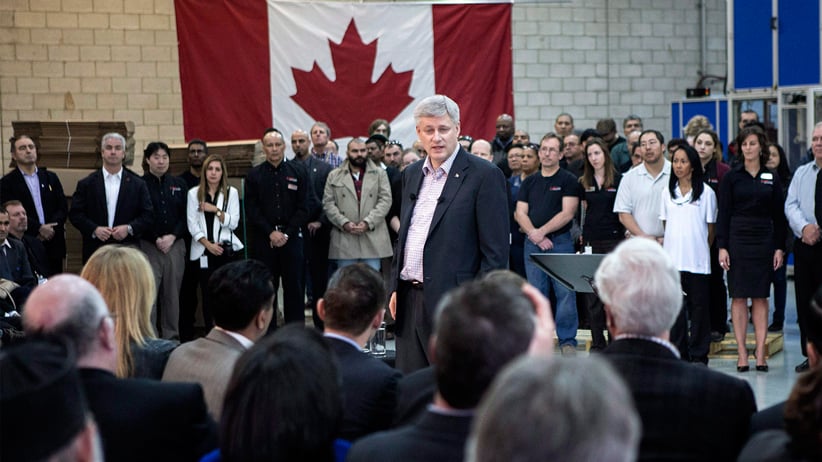The Conservatives are levelling the playing field. Maybe.
Will a shadowy pro-Conservative fundraising organization change the 2015 election? Probably not. Paul Wells explains.
Prime Minister Stephen Harper announces a government initiative to help assist small and medium-sized businesses to open new markets abroad, in Mississauga, Ont. on Wednesday, March 18 2015. Chris Young/CP
Share

Having poked around on this story for the last few hours, I don’t know what to make of it:
The Conservative Party of Canada’s former executive director has set up what could be a game-changing new organization to raise money and promote the benefits of “a strong, stable Conservative government” while bypassing the legal limits on fundraising faced by political parties, iPolitics has learned.
All of this seems to be true. Dan Hilton, who was replaced by Dimitri Soudas as Conservative Party general director—before Soudas, in turn, became the nation’s most entertaining Schrödinger’s box of partisan affiliation—seems to be behind Conservative Voice, which has a website you can donate money to if you believe “Canadians deserve to hear the truth about the benefits of a strong, stable conservative government.” (Note the lower-case ‘c,’ a handy fig leaf in case anyone believes this is a Conservative Party front, because perish the thought!) The bit about “bypassing the legal limits” depends on interpretation: Hilton insists on his website that Conservative Voice “will remain fully compliant with any legislation that restricts third-party advertising during a writ.” It appears that a donation to Conservative Voice could be treated as a business expense for tax purposes, like buying office furniture. The website does inform potential donors that they cannot expect a charitable donation receipt.
In an interview with iPolitics’ Elizabeth Thompson, Hilton said Conservative Voice “is simply a group of people who are trying to level the playing field and make sure that the right’s perspective is adequately represented in papers and the media.”
And again, it’s hard to know what to make of this. Two senior federal Conservatives I contacted, normally fully briefed on fiendish Conservative plots to win Yet Another federal election, told me they had never heard of Conservative Voice before they read this morning’s story.
Both of my shadowy sources were fully onside with Hilton’s “level the playing field” view that Conservatives need money and messaging to counter the overwhelming influence of Big Leftism in this country. Exhibit A was the Working Families Coalition, a union-funded PAC that runs ads against the Ontario Conservatives at every election, a state of affairs “that has now been entrenched for four electoral cycles and continues to wallop us,” one said.
There are, however, problems. The main one, my other source said, is: “Where’s the money going to come from?” To the Conservatives’ opponents, the answer is as obvious as it is nebulous: the Conservatives’ Corporate Friends. That doesn’t actually answer the question, though. “As any Conservative who’s ever tried to raise money from big business would tell you, big business in this country isn’t Conservative,” this person said. “It’s pretty overwhelmingly Liberal—or apolitical; it just doesn’t want to be bothered.”
All it would take would be one vastly well-off right-winger to change all that. “I’ve always thought it would take some deeply committed, ideologically motivated billionaire.” There’s precedent: Conrad Black and Pierre Karl Péladeau, in different ways, set up megaphones to extend their personal advocacy. Their success rate is highly debatable. On the night before the 2000 election, then-prime minister Jean Chrétien told a bunch of reporters following him around, “Black told a British newspaper that by the time he got done with Chrétien, you’d need an eye dropper to pick the pieces up. We’ll see tomorrow.” Chrétien knew he was on his way to an enlarged Liberal majority. “Lord,” he said, “what a victory!”
Conservative Voice is perhaps best understood as the expression of a mindset. Conservatives believe, by and large, that they are surrounded, outnumbered, and playing against a stacked deck. No amount of contrary evidence—three consecutive election victories, the 2011 endorsement of every major-market English-language newspaper in Canada except the Toronto Star, books like mine—will change that perception. Conservatives believe that if yet another victory is at risk, it’s because the media, the Central Canadian institutional elite, the labour unions and even big business are against them. Hilton, who worked hard on the inside to make sure Harper won a fourth election, will now work hard on the outside to the same end.
Perhaps I am naive to doubt the decisive influence of money either for or against Conservatives. In 1992, all the money and the big campaign muscle was behind the Charlottetown Accord for constitutional change. It lost, thumpingly, all the same. In 1988, money, including big-business campaign money, backed the Brian Mulroney Progressive Conservatives because they backed free trade with the U.S.; while Mulroney won that election, most Canadians voted for parties that opposed his project. If Tim Hudak had avoided some fairly elementary errors, the Working Families Coalition might not have been able to stop him getting elected in Ontario. The really radical theory in Canadian politics is the free agency of Canadian voters. But since political actors don’t buy the idea that free will exists, or can’t be confident it does, it’s not surprising they’ll be creative in finding ways to woo, seduce or bully it.